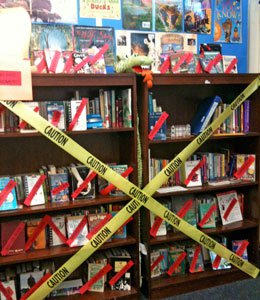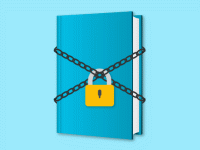Banned Books Week: Slaying Censorship
The American Library Association’s Banned Books Week is a time to pay special homage to censored books.
Your content has been saved!
Go to My Saved Content.I’m an avid celebrator of Banned Books Week. It becomes a way to make reading sexy—the exact opposite of what those who challenge or ban books have intended. Cue evil laughter.
The American Library Association’s Banned Books Week is a way to celebrate brave and creative authors—and the freedom to read, yes. But more importantly, it’s a way to celebrate students’ ability to think for themselves.
Sure, some books are not appropriate for every kid at every age, but to make that book inaccessible, as dictated by people who believe themselves to be the almighty word in literature, is wrong.
Any kid in your classroom can grow up to write any book they want. Any kid in your classroom can become an author. Any kid in your classroom has the right to find an audience of readers who use their own critical thinking skills to determine whether they approve or disapprove.
I remember I was in fifth grade when Judy Blume’s Forever came out. (Teenage sex was the focus of this teen fiction.) It took my teacher only one red-faced blowup and dramatic text tearing for it to spread like wildfire among us girls. And then, of course, the boys picked it up because they wanted to know what all the fuss was about.

A few years back, the series about teen vampires, Twilight, was all the rage. I reviewed the series on my own website, and I admit I was not a fan. But the theme of my review was this: Don’t censor. Be a part of the conversations by reading what your kids are reading. Be one of the voices in their head when they’re making their reading decisions.
So celebrate Banned Books Week. Celebrate dialogue. Celebrate book talks, even about those you might not like, or approve of. Celebrate the Constitution. Celebrate the liberty of literacy.
Here are some of the things I do in my own classroom library:
- Get “Crime Scene” or “Caution” tape. Our whole school is under construction, so that was no problem for me.
- Go to the ALA website and download any and all lists of banned or challenged books.
- Post quotes to inspire quick writes. I’m using this John Adams line: “Liberty cannot be preserved without a general knowledge among the people.”
- Post signs daring students to read the books. Even more effective: Demand that they not read them: “DO NOT READ. IF YOU READ THIS, YOUR MIND WILL BE CORRUPTED.”
- Post the First Amendment.
- Find any and all books in your classroom library that appear on the lists and pull them out, putting “Banned” signs on them. (Make sure you have plenty of sign-out sheets, because they’re going to fly off your shelves like hotcakes!)
